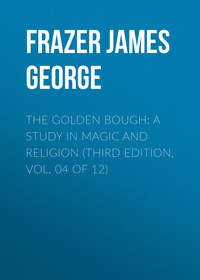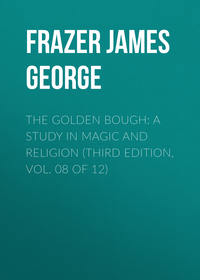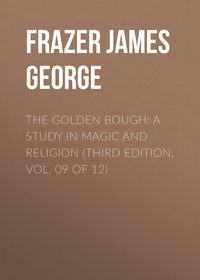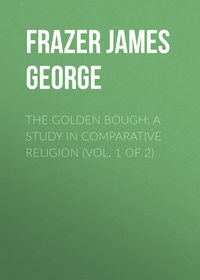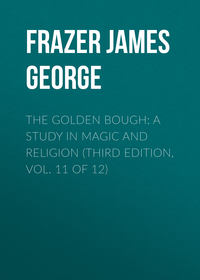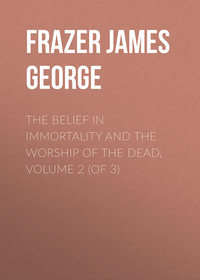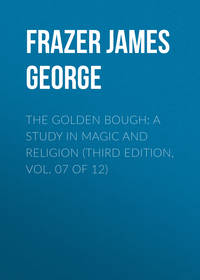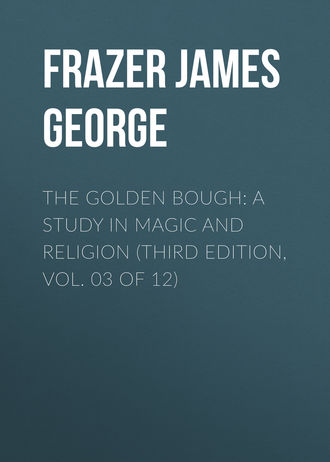 полная версия
полная версияThe Golden Bough: A Study in Magic and Religion (Third Edition, Vol. 03 of 12)
In order to avoid the use of people's own names, parents are sometimes named after their children, uncles and aunts after their nephews and nieces, and so forth. The common custom of naming parents after their children seems to arise from a reluctance to mention the real names of persons addressed or directly referred to.
When it is deemed necessary that a man's real name should be kept secret, it is often customary, as we have seen, to call him by a surname or nickname. As distinguished from the real or primary names, these secondary names are apparently held to be no part of the man himself, so that they may be freely used and divulged to everybody without endangering his safety thereby. Sometimes in order to avoid the use of his own name a man will be called after his child. Thus we are informed that “the Gippsland blacks objected strongly to let any one outside the tribe know their names, lest their enemies, learning them, should make them vehicles of incantation, and so charm their lives away. As children were not thought to have enemies, they used to speak of a man as ‘the father, uncle, or cousin of So-and-so,’ naming a child; but on all occasions abstained from mentioning the name of a grown-up person.”1248 Similarly among the Nufoors of Dutch New Guinea, grown-up persons who are related by marriage may not mention each other's names, but it is lawful to mention the names of children; hence in order to designate a person whose name they may not pronounce they will speak of him or her as the father or mother of So-and-so.1249 The Alfoors of Poso, in Celebes, will not pronounce their own names. Among them, accordingly, if you wish to ascertain a person's name, you ought not to ask the man himself, but should enquire of others. But if this is impossible, for example, when there is no one else near, you should ask him his child's name, and then address him as the “Father of So-and-so.” Nay, these Alfoors are shy of uttering the names even of children; so when a boy or girl has a nephew or niece, he or she is addressed as “Uncle of So-and-so,” or “Aunt of So-and-so.”1250 In pure Malay society, we are told, a man is never asked his name, and the custom of naming parents after their children is adopted only as a means of avoiding the use of the parents' own names. The writer who makes this statement adds in confirmation of it that childless persons are named after their younger brothers.1251 Among the land Dyaks of northern Borneo children as they grow up are called, according to their sex, the father or mother of a child of their father's or mother's younger brother, or sister,1252 that is, they are called the father or mother of what we should call their first cousin. The Caffres used to think it discourteous to call a bride by her own name, so they would call her “the Mother of So-and-so,” even when she was only betrothed, far less a wife and a mother.1253 Among the Kukis and Zemis or Kacha Nagas of Assam parents drop their own names after the birth of a child and are named Father and Mother of So-and-so. Childless couples go by the names of “the childless father,” “the childless mother,” “the father of no child,” “the mother of no child.”1254 A Zulu woman may not utter her husband's name; if she speaks to or of him she says, “Father of So-and-so,” mentioning the name of one of his children.1255 A Hindoo woman will not name her husband. If she has to refer to him she will designate him as the father of her child or by some other periphrasis.1256 The widespread custom of naming a father after his child has sometimes been supposed to spring from a desire on the father's part to assert his paternity, apparently as a means of obtaining those rights over his children which had previously, under a system of mother-kin, been possessed by the mother.1257 But this explanation does not account for the parallel custom of naming the mother after her child, which seems commonly to co-exist with the practice of naming the father after the child. Still less, if possible, does it apply to the customs of calling childless couples the father and mother of children which do not exist, of naming people after their younger brothers, and of designating children as the uncles and aunts of So-and-so, or as the fathers and mothers of their first cousins. But all these practices are explained in a simple and natural way if we suppose that they originate in a reluctance to utter the real names of persons addressed or directly referred to. That reluctance is probably based partly on a fear of attracting the notice of evil spirits, partly on a dread of revealing the name to sorcerers, who would thereby obtain a handle for injuring the owner of the name.1258
§ 2. Names of Relations tabooed
The names of persons related to the speaker by blood and especially by marriage may often not be mentioned. Women's speech among the Caffres.
It might naturally be expected that the reserve so commonly maintained with regard to personal names would be dropped or at least relaxed among relations and friends. But the reverse of this is often the case. It is precisely the persons most intimately connected by blood and especially by marriage to whom the rule applies with the greatest stringency. Such people are often forbidden, not only to pronounce each other's names, but even to utter ordinary words which resemble or have a single syllable in common with these names. The persons who are thus mutually debarred from mentioning each other's names are especially husbands and wives, a man and his wife's parents, and a woman and her husband's father. For example, among the Caffres of South Africa a woman may not publicly pronounce the birth-name of her husband or of any of his brothers, nor may she use the interdicted word in its ordinary sense. If her husband, for instance, be called u-Mpaka, from impaka, a small feline animal, she must speak of that beast by some other name.1259 Further, a Caffre wife is forbidden to pronounce even mentally the names of her father-in-law and of all her husband's male relations in the ascending line; and whenever the emphatic syllable of any of their names occurs in another word, she must avoid it by substituting either an entirely new word, or, at least, another syllable in its place. Hence this custom has given rise to an almost distinct language among the women, which the Caffres call Ukuteta Kwabafazi or “women's speech.”1260 The interpretation of this “women's speech” is naturally very difficult, “for no definite rules can be given for the formation of these substituted words, nor is it possible to form a dictionary of them, their number being so great – since there may be many women, even in the same tribe, who would be no more at liberty to use the substitutes employed by some others, than they are to use the original words themselves.”1261 A Caffre man, on his side, may not mention the name of his mother-in-law, nor may she pronounce his; but he is free to utter words in which the emphatic syllable of her name occurs.1262 In Northern Nyassaland no woman will speak the name of her husband or even use a word that may be synonymous with it. If she were to call him by his proper name, she believes it would be unlucky and would affect her powers of conception. In like manner women abstain, for superstitious reasons, from using the common names of articles of food, which they designate by terms peculiar to themselves.1263 Among the Kondes, at the north-western end of Lake Nyassa, a woman may not mention the name of her father-in-law; indeed she may not even speak to him nor see him.1264 Among the Barea and Bogos of Eastern Africa a woman never mentions her husband's name; a Bogo wife would rather be unfaithful to him than commit the monstrous sin of allowing his name to pass her lips.1265 Among the Haussas “the first-born son is never called by his parents by his name; indeed they will not even speak with him if other people are present. The same rule holds good of the first husband and the first wife.”1266 In antiquity Ionian women would not call their husbands by their names.1267 While the rites of Ceres were being performed in Rome, no one might name a father or a daughter.1268 Among the South Slavs at the present day husbands and wives will not mention each other's names, and a young wife may not call any of her housemates by their true names; she must invent or at least adopt other names for them.1269 A Kirghiz woman dares not pronounce the names of the older relations of her husband, nor even use words which resemble them in sound. For example, if one of these relations is called Shepherd, she may not speak of sheep, but must call them “the bleating ones”; if his name is Lamb, she must refer to lambs as “the young of the bleating ones.”1270 After marriage an Aino wife may not mention her husband's name; to do so would be deemed equivalent to killing him.1271 Among the Sgaus, a Karen tribe of Burma, children never mention their parents' names.1272 A Toda man may not utter the names of his mother's brother, his grandfather and grandmother, his wife's mother, and of the man from whom he has received his wife, who is usually the wife's father. All these names are tabooed to him in the lifetime of the persons who bear them, and after death the prohibitions are not only maintained but extended.1273 In southern India wives believe that to tell their husband's name or to pronounce it even in a dream would bring him to an untimely end. Further, they may not mention the names of their parents, their parents-in-law, and their brothers-in-law and sisters-in-law.1274 Among the Ojebways husbands and wives never mention each other's names;1275 among the Omahas a man and his father-in-law and mother-in-law will on no account utter each other's names in company.1276 A Dacota “is not allowed to address or to look towards his wife's mother, especially, and the woman is shut off from familiar intercourse with her husband's father and others, and etiquette prohibits them from speaking the names of their relatives by marriage.” “None of their customs,” adds the same writer, “is more tenacious of life than this; and no family law is more binding.”1277 In the Nishinam tribe of California “a husband never calls his wife by name on any account, and it is said that divorces have been produced by no other provocation than that.”1278
Names of relations, especially of persons related to the speaker by marriage, may not be mentioned in the East Indies.
The Battas or Bataks of Sumatra display a great aversion to mentioning their own names and a still greater aversion to mentioning the names of their parents, grandparents, or elder blood-relations. Politeness forbids the putting of direct questions on this subject, so that the investigation of personal identity becomes difficult and laborious. When a Batta expects to be questioned as to his relations, he will usually provide himself with a friend to answer for him.1279 A Batak man may never mention the names of his wife, his daughter-in-law and of his son-in-law; a woman is most particularly forbidden to mention the name of the man who has married her daughter.1280 Among the Karo-Bataks the forbidden names are those of parents, uncles, aunts, parents-in-law, brothers and sisters, and especially grandparents.1281 Among the Dyaks a child never pronounces the names of his parents, and is angry if any one else does so in his presence. A husband never calls his wife by her name, and she never calls him by his. If they have children, they name each other after them, “Father of So-and-so” and “Mother of So-and-so”; if they have no children they use the pronouns “he” and “she,” or an expression such as “he or she whom I love”; and in general, members of a Dyak family do not mention each other's names.1282 Moreover, when the personal names happen also, as they often do, to be names of common objects, the Dyak is debarred from designating these objects by their ordinary names. For instance, if a man or one of his family is called Bintang, which means “star,” he must not call a star a star (bintang); he must call it a pariama. If he or a member of his domestic circle bears the name of Bulan, which means “moon,” he may not speak of the moon as the moon (bulan); he must call it penala. Hence it comes about that in the Dyak language there are two sets of distinct names for many objects.1283 Among the sea Dyaks of Sarawak a man may not pronounce the name of his father-in-law or mother-in-law without incurring the wrath of the spirits. And since he reckons as his father-in-law and mother-in-law not only the father and mother of his own wife, but also the fathers and mothers of his brothers' wives and sisters' husbands, and likewise the fathers and mothers of all his cousins, the number of tabooed names may be very considerable and the opportunities of error correspondingly numerous. To make confusion worse confounded, the names of persons are often the names of common things, such as moon, bridge, barley, cobra, leopard; so that when any of a man's many fathers-in-law and mothers-in-law are called by such names, these common words may not pass his lips.1284 Among the Dyaks of Landak and Tajan it is forbidden to mention the names of parents and grandparents, sometimes also of great-grandparents, whether they are alive or dead.1285 Among the Alfoors or Toradjas of Poso, in central Celebes, you may not pronounce the names of your father, mother, grandparents, and other near relations. But the strictest taboo is on the names of parents-in-law. A son-in-law and a daughter-in-law may not only never mention the names of their parents-in-law, but if the names happen to be ordinary words of the language, they may never allow the words in their common significance to pass their lips. For example, if my father is called Njara (“horse”), I may not speak of him by that name; but in speaking of the animal I am free to use the word horse (njara). But if my father-in-law is called Njara, the case is different, for then not only may I not refer to him by his name, but I may not even call a horse a horse; in speaking of the animal I must use some other word. The missionary who reports the custom is acquainted with a man whose mother-in-law rejoices in the name of Ringgi (“rixdollar”). When this man has occasion to refer to real rixdollars, he alludes to them delicately as “large guilders” (roepia bose). Another man may not use the ordinary word for water (oewe); in speaking of water he employs a word (owai) taken from a different dialect. Indeed, among these Alfoors it is the common practice in such cases to replace the forbidden word by a kindred word of the same significance borrowed from another dialect. In this way many fresh terms or new forms of an old word pass into general circulation.1286 Among the Alfoors of Minahassa, in northern Celebes, the custom is carried still further so as to forbid the use even of words which merely resemble the personal names in sound. It is especially the name of a father-in-law which is thus laid under an interdict. If he, for example, is called Kalala, his son-in-law may not speak of a horse by its common name kawalo; he must call it a “riding-beast” (sasakajan).1287 So among the Alfoors of the island of Buru it is taboo to mention the names of parents and parents-in-law, or even to speak of common objects by words which resemble these names in sound. Thus, if your mother-in-law is called Dalu, which means “betel,” you may not ask for betel by its ordinary name, you must ask for “red mouth” (mue miha); if you want betel-leaf, you may not say betel-leaf (dalu 'mun), you must say karon fenna. In the same island it is also taboo to mention the name of an elder brother in his presence.1288 Transgressions of these rules are punished with fines.1289 In Bolang Mongondo, a district in the west of Celebes, the unmentionable names are those of parents, parents-in-law, uncles and aunts.1290 Among the Alfoors of Halmahera a son-in-law may never use his father-in-law's name in speaking to him; he must simply address him as “Father-in-law.”1291 In Sunda it is thought that a particular crop would be spoilt if a man were to mention the names of his father and mother.1292
Names of persons related by marriage to the speaker are tabooed in New Guinea.
Among the Nufoors, as we have seen,1293 persons who are related to each other by marriage are forbidden to mention each other's names. Among the connexions whose names are thus tabooed are wife, mother-in-law, father-in-law, your wife's uncles and aunts and also her grand-uncles and grand-aunts, and the whole of your wife's or your husband's family in the same generation as yourself, except that men may mention the names of their brothers-in-law, though women may not. The taboo comes into operation as soon as the betrothal has taken place and before the marriage has been celebrated. Families thus connected by the betrothal of two of their members are not only forbidden to pronounce each other's names; they may not even look at each other, and the rule gives rise to the most comical scenes when they happen to meet unexpectedly. And not merely the names themselves, but any words that sound like them are scrupulously avoided and other words used in their place. If it should chance that a person has inadvertently uttered a forbidden name, he must at once throw himself on the floor and say, “I have mentioned a wrong name. I throw it through the chinks of the floor in order that I may eat well.”1294 In German New Guinea near relations by marriage, particularly father-in-law and daughter-in-law, mother-in-law and son-in-law, as well as brothers-in-law and sisters-in-law, must see as little of each other as possible; they may not converse together and they may not mention each other's names, not even when these names have passed to younger members of the family. Thus if a child is called after its deceased paternal grandfather, the mother may not call her child by its name but must employ another name for the purpose.1295 Among the Yabim, for example, on the south-east coast of German New Guinea, parents-in-law may neither be touched nor named. Even when their names are borne by other people or are the ordinary names of common objects, they may not pass the lips of their sons-in-law and daughters-in-law.1296 Among the western tribes of British New Guinea the principal taboo or sabi, as it is there called, concerns the names of relatives by marriage. A man may not mention the name of his wife's father, mother, elder sister, or elder brother, nor the name of any male or female relative of her father or mother, so long as the relative in question is a member of the same tribe as the speaker. The names of his wife's younger brothers and sisters are not tabooed to him. The same law applies to a woman with reference to the names of her husband's relatives. As a general rule, this taboo does not extend outside the tribal boundaries. Hence when a man or woman marries out of his or her tribe, the taboo is usually not applied. And when members of one tribe, who may not pronounce each other's names at home, are away from their own territory, they are no longer strictly bound to observe the prohibition. A breach of the taboo has to be atoned for by the offender paying a fine to the person whose name he has taken in vain. Until that has been done, neither of the parties concerned, if they are males, may enter the men's club-house. In the old times the offended party might recover his social standing by cutting off somebody else's head.1297
Names of persons related by marriage to the speaker are tabooed in Melanesia.
In the western islands of Torres Straits a man never mentioned the personal names of his father-in-law, mother-in-law, brother-in-law, and sister-in-law; and a woman was subject to the same restrictions. A brother-in-law might be spoken of as the husband or brother of some one whose name it was lawful to mention; and similarly a sister-in-law might be called the wife of So-and-so. If a man by chance used the personal name of his brother-in-law, he was ashamed and hung his head. His shame was only relieved when he had made a present as compensation to the man whose name he had taken in vain. The same compensation was made to a sister-in-law, a father-in-law, and a mother-in-law for the accidental mention of their names. This disability to use the personal names of relatives by marriage was associated with the custom, so common throughout the world, that a man or woman is not allowed to speak to these relatives. If a man wished to communicate with his father-in-law or mother-in-law, he spoke to his wife and she spoke to her parent. When direct communication became absolutely necessary, it was said that a man might talk to his father-in-law or mother-in-law a very little in a low voice. The behaviour towards a brother-in-law was the same.1298 Similar taboos on the names of persons connected by marriage are in force in New Britain and New Ireland.1299 Among the natives who inhabit the coast of the Gazelle Peninsula in New Britain to mention the name of a brother-in-law is the grossest possible affront you can offer to him; it is a crime punishable with death.1300 In the Santa Cruz and Reef Islands a man is forbidden to pronounce the name of his mother-in-law, and he may never see her face so long as he lives. She on her side lies under similar restrictions in regard to him. Further, a man is prohibited from mentioning the name of his son-in-law, though he is allowed to look at him. And if a husband has paid money for his wife to several men, none of these men may ever utter his name or look him in the face. If one of them did by chance look at him, the offended husband would destroy some of the offender's property.1301 In New Caledonia a brother may not mention his sister's name, and she may not mention his. The same rule is observed by male and female cousins in regard to each other's names.1302 In the Banks' Islands, Melanesia, the taboos laid on the names of persons connected by marriage are very strict. A man will not mention the name of his father-in-law, much less the name of his mother-in-law, nor may he name his wife's brother; but he may name his wife's sister – she is nothing to him. A woman may not name her father-in-law, nor on any account her son-in-law. Two people whose children have intermarried are also debarred from mentioning each other's names. And not only are all these persons forbidden to utter each other's names; they may not even pronounce ordinary words which chance to be either identical with these names or to have any syllables in common with them. “A man on one occasion spoke to me of his house as a shed, and when that was not understood, went and touched it with his hand to shew what he meant; a difficulty being still made, he looked round to be sure that no one was near and whispered, not the name of his son's wife, but the respectful substitute for her name, amen Mulegona, she who was with his son, and whose name was Tuwarina, Hind-house.” Again, we hear of a native of these islands who might not use the common words for “pig” and “to die,” because these words occurred in the polysyllabic name of his son-in-law; and we are told of another unfortunate who might not pronounce the everyday words for “hand” and “hot” on account of his wife's brother's name, and who was even debarred from mentioning the number “one,” because the word for “one” formed part of the name of his wife's cousin.1303
Names of relations tabooed in Australia.
It might be expected that similar taboos on the names of relations and on words resembling them would commonly occur among the aborigines of Australia, and that some light might be thrown on their origin and meaning by the primitive modes of thought and forms of society prevalent among these savages. Yet this expectation can scarcely be said to be fulfilled; for the evidence of the observance of such customs in Australia is scanty and hardly of a nature to explain their origin. We are told that there are instances “in which the names of natives are never allowed to be spoken, as those of a father or mother-in-law, of a son-in-law, and some cases arising from a connection with each other's wives.”1304 Among some Victorian tribes, a man never at any time mentioned the name of his mother-in-law, and from the time of his betrothal to his death neither she nor her sisters might ever look at or speak to him. He might not go within fifty yards of their habitation, and when he met them on a path they immediately left it, clapped their hands, and covering up their heads with their rugs, walked in a stooping posture and spoke in whispers until he had gone by. They might not talk with him, and when he and they spoke to other people in each other's presence, they used a special form of speech which went by the name of “turn tongue.” This was not done with any intention of concealing their meaning, for “turn tongue” was understood by everybody.1305 A writer, who enjoyed unusually favourable opportunities of learning the language and customs of the Victorian aborigines, informs us that “A stupid custom existed among them, which they called knal-oyne. Whenever a female child was promised in marriage to any man, from that very hour neither he nor the child's mother were permitted to look upon or hear each other speak nor hear their names mentioned by others; for, if they did, they would immediately grow prematurely old and die.”1306 Among the Gudangs of Cape York, in Queensland, and the Kowraregas of the Prince of Wales Islands, a man carefully avoids speaking to or even mentioning the name of his mother-in-law, and his wife acts similarly with regard to her father-in-law. “Thus the mother of a person called Nuki – which means water – is obliged to call water by another name.”1307 In the Booandik tribe of South Australia persons connected by marriage, except husbands and wives, spoke to each other in a low whining voice, and employed words different from those in common use.1308 Another writer, speaking of the same tribe, says: “Mothers-in-law and sons-in-law studiously avoid each other. A father-in-law converses with his son-in-law in a low tone of voice, and in a phraseology differing somewhat from the ordinary one.”1309


